Carbon footprint is expressed in number of grams of CO2 equivalent per 100g of product.
This calculation includes the method of product’s production, transport, storage and a part of Ecodis CO2 emissions.
Here are few reference points:
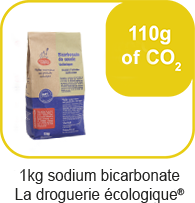
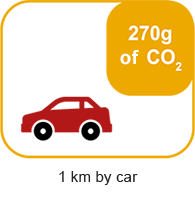
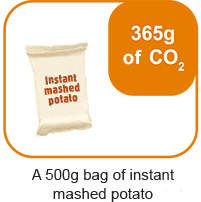
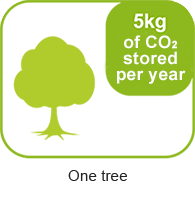
In details, 2 examples :
 Sodium bicarbonate in 1kg brown paper:
Sodium bicarbonate in 1kg brown paper:
its carbon footprint is 110g and 88.8% of greenhouse gas emissions are due to the raw material making up this product and its mining from quarries.
![]() Liquid green soap 1L:
Liquid green soap 1L:
its carbon footprint is 75g and the major part of greenhouse gas emissions is due to the raw materials making up the soap, to its packaging (recyclable PET) and its transport.
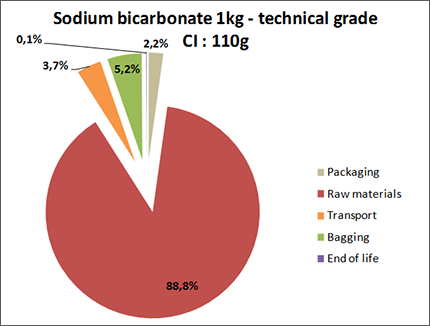
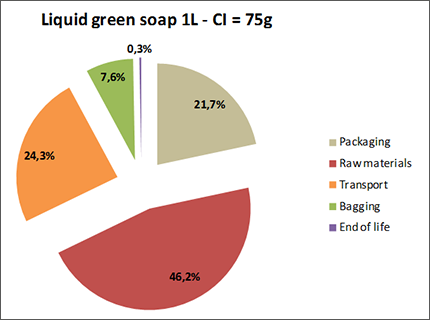
The table below presents the carbon footprint of the products:
| Product | Carbon footprint |
| Sodium bicarbonate 500g – food grade | 140g |
| Bee wax 400g | 54g |
| Sodium bicarbonate 500g – technical grade | 120g |
| Sodium bicarbonate 1kg – technical grade | 120g |
| Sodium bicarbonate 2,5kg | 130g |
| Meudon white tube 500g | 42g |
| Sodium percarbonate 1kg | 180g |
| Soda crystal 500g | 86g |
| Diatomeaceous earth tube 250g | 104g |
| Sommières earth tube 400g | 72g |
| Sommieres earth refill 400g | 54g |
| Citric acid 1kg | 360g |
| Liquid wax 500mL | 85g |
| Brown polish | 250g |
| Colourless polish | 250g |
| Black polish | 240g |
| Waterproofing balm | 250g |
| Limewater 500ml | 41g |
| Garbage bags 30L and 50L | 68g |
| Garbage bags 100L | 55g |
![]()
| Product | Carbon footprint |
| Thin latex gloves | 250g |
| Milk wax 1L | 71g |
| Claystone 125g | 110g |
| Claystone 500g | 110g |
| Green soap paste sunflower 1kg | 88g |
| Green soap paste olive 1kg | 53g |
| Soap flakes 1kg | 180g |
| Liquid green soap linseed oil 1L | 61g |
| Liquid green soap linseed oil 5L | 56g |
| Liquid green soap olive oil 1L | 53g |
| Liquid green soap olive 5L | 45g |
| Dégrip’tout® 200mL (spray) | 150g |
| Dégrip’tout® 500mL (recharge) | 140g |
| Alcohol vinegar 8% 1L | 38g |
| Alcohol vinegar 8% 5L | 39g |
| Alcohol vinegar 12% 1L | 32g |
| Vinegar gel 12% | 50g |



